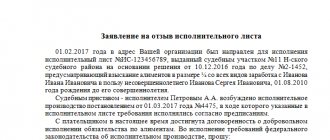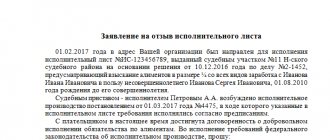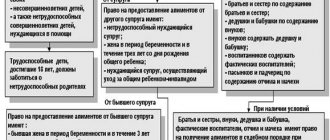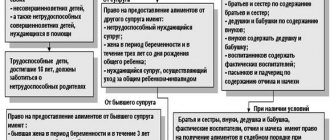Alimony obligations are established on a long-term basis and it is impossible to refuse their fulfillment.
Alimony obligations are established on a long-term basis, and it is impossible to refuse their fulfillment. If the circumstances of the alimony relationship between the payer and the recipient are violated, the violator will be held liable in accordance with current legislation.
However, in some situations, the termination of child support obligations may occur. However, all this can happen provided that it does not violate the main provisions of the current legislative framework and is in full compliance with the legal framework.
Grounds for termination of alimony obligations
Termination of alimony obligations is regulated at the legislative level. This issue is discussed in paragraph 1 of Article 120 of the RF IC. In accordance with this legislative standard, alimony relationships can be terminated under the following circumstances:
- If one of the parties to the alimony agreement suddenly died;
- If the contract has expired and the parties do not intend to renew it in the future;
- When children reach 18 years of age. In some situations, child support obligations may be extended until the child receives higher education;
As a result of the occurrence of other conditions that are provided for in accordance with the provisions of alimony agreements. For example, this could be the restoration of the alimony recipient’s ability to work, or the improvement of the recipient’s financial circumstances, as a result of which he will not need financial assistance from the payer.
Articles on the topic (click to view)
- What to do legally if a mother does not pay child support
- Legal assistance to orphans
- Conditions for receiving and amount of maternity capital for a second child after 2021
- Federal Law 159 on additional guarantees for social support for orphans
- Fixed child support under the new law of 2021 if the father works
- Form of agreement on payment of alimony for a minor child: sample 2021
- Conditions and documents for obtaining a plot of land for a third child in 2021 in Moscow
As for the grounds for termination of alimony obligations, which are collected by decision of the courts, they are listed in paragraph 2 of Article 120 of the RF IC. In accordance with them, the payment of child support benefits ceases when the child reaches the age of majority. However, in some situations, payments may be extended if compelling circumstances exist.
In addition, termination of child support obligations may occur in cases where a child who has reached the age of 16 receives full legal capacity as a result of emancipation, or in accordance with a court decision.
Child support debt after the death of a child
Different situations happen in life. Sometimes they are very sad; children cannot always live longer than their parents.
Moreover, if the child lived with one of the parents and received irregular financial assistance from the second, the question arises as to whether the payer is obliged to pay the resulting alimony debt after the death of the child.
According to the law, it is impossible to collect alimony debt in this case..
The fact is that, in accordance with Article 418 of the Civil Code of the Russian Federation, the debt for monetary payments, as well as payments for monetary obligations, are terminated due to the death of the child to whom the monetary payments were addressed.
Therefore, in the event of the death of a child who received financial assistance and to whom the braider owed money, the person obligated to make payments is exempted not only from paying alimony, but also from reimbursing the resulting debt.
The fact that the debt was formed during the child’s lifetime does not matter.
Death of one of the parties to the alimony obligation
One of the most common reasons for terminating a child support agreement is the death of one of the parties to the agreement. In particular, it is assumed that alimony obligations cannot be inherited, and therefore in such a situation the contract is terminated and it loses its legal force.
If the alimony payer unexpectedly dies, he is released from financial responsibility to the recipient of the payments. In essence, this event means that the agreements are no longer valid and the agreement is declared terminated.
In that situation, if the recipient of payments dies, the payer also acquires the right to terminate the agreement, unless otherwise provided in accordance with its basic provisions.
Is it possible to return previously paid alimony due to newly discovered circumstances?
If, during the consideration of the case in court, it is established that the payer of alimony paid it in the absence of legal grounds, it will not be possible to claim it back. Exceptions - Art. 116 RF IC:
- The court's decision to collect alimony was canceled because the recipient provided false information/submitted false documents to the court.
- The agreement to pay alimony was declared invalid due to its conclusion under the influence of threats/deception/violence from the recipient of the payment.
- The court verdict established the fact of falsification of the court decision/agreement on the payment of alimony/writ of execution, which was the basis for their payment.
Important! If the actions set out above were committed by a representative of a minor child/incapacitated adult recipient of the payment, they will not be recovered back. These amounts are recovered from the guilty representative at the claim of the alimony payer - clause 3 of Art. 116 RF IC.
Expiration of the alimony agreement
Most child support agreements that do not relate to the maintenance of minor children have a limited duration. In particular, such agreements may include the obligation to support the recipient of payments until he restores his health or improves his financial situation.
Taking this fact into account, when signing agreements, a deadline is determined, after which it will be considered that the payer has fully fulfilled its obligations to the recipient of alimony payments, and therefore the agreement can be terminated, as a result of which it loses its legal force.
It is worth paying attention to the fact that by decision of the parties, or in accordance with a court order, the validity period of the agreement may be adjusted. In particular, if the recipient of payments restores his financial stability earlier than planned, the payer has the right through the court to obtain the removal of his obligations to pay maintenance.
If, after the expiration of the agreement, the recipient continues to need financial assistance, then he can apply to the court with a request to extend the agreement.
Results
The RF IC (Article 90) specifies several situations when a man is obliged to pay money for the maintenance of his wife. But in Art. 92 of the Family Code there are a number of exceptions that allow you to escape the financial burden. To resolve the issue, you can reach an agreement directly with your spouse or go to court. In the latter case, you will have to collect papers confirming the spouse’s position and allowing you to avoid payments.
Each case is individual. Everything that is written in the statement of claim must be supported by documents. If you have any doubts, contact our website lawyers for a free consultation.
Child reaching adulthood
In accordance with the current provisions of family law, the main responsibility of the parents of a minor child is his maintenance and material support. Moreover, it is impossible to get rid of or refuse this responsibility.
In accordance with current legislative standards, payment of alimony for the maintenance of a child occurs until he turns 18 years old and acquires full legal capacity.
But at the same time, the legislation provides for situations in which alimony obligations will be extended.
In particular, if a child is studying and does not have the opportunity to fully provide himself with everything necessary, then, by a court decision, child support obligations on the part of his parents can be extended until he completes his studies. However, it is worth noting that this circumstance applies only in situations where the child is in full-time residential education.
A similar situation may arise in situations where a child is seriously ill and needs financial assistance, or his ability to work is limited for some reason.
This is important to know: Child support for the second child, if the first one is already paid
Regulatory acts
When considering the issue of maintaining a wife, it is enough to look at the RF IC, where the issue is highlighted in several articles of Chapter 14. Let us highlight the main ones:
- Art. 89. The obligations of the spouses regarding mutual maintenance in the event of certain circumstances are specified.
- Art. 90. The rights of the husband/wife to alimony payments in the event of divorce are prescribed.
- Art. 91. The amount of alimony payments assigned through the court is indicated.
- Art. 92. The reasons for obtaining the cancellation of alimony for spousal maintenance are specified.
These are the main articles that official bodies and the court are guided by when assigning material content. The latest changes to the RF IC and the above articles were made on February 6, 2021, which requires separate consideration. Let us immediately note that the RF IC specifies only general rules, and each issue is considered individually.
Adopting a child
In some situations, the termination of child support obligations may be established if the child to whom the payments were made was adopted and received official legal guardians. This circumstance arises on the basis that, according to the basic dogmas of family law, adoptive families and guardians acquire the same rights and responsibilities in relation to the child as his biological parents. That is, in essence, there is a transfer of parental rights and obligations, including child support, to his guardians.
This issue, which directly affects the termination of child support payments, is considered in accordance with Article 440 of the Code of Civil Procedure. It is stated here that the appearance of guardians for a child and the presence of a court decision on adoption are sufficient circumstances for the termination of child support obligations on the part of his biological parents.
However, it is worth noting that the court decision on adoption does not exempt the parent who pays child support from making payments if, in accordance with paragraph 3 of Article 137 of the RF IC, certain obligations and personal non-property rights were retained during adoption. In such a situation, this parent may be released from child support obligations only with the consent of the adoptive parents.
Other grounds - termination of alimony obligations
Some agreements signed by the payer and recipient of alimony payments provide for the automatic cancellation of the agreement if certain circumstances occur.
In particular, if the alimony agreement was accepted on the basis of the poor financial situation of the recipient of the payments, then if his financial stability is restored, the agreement will terminate and the payer will be relieved of maintenance responsibilities.
A similar decision will be made by the court if the agreement states that alimony is paid until the recipient restores his ability to work and is able to independently provide himself with everything necessary. As soon as the recipient’s ability to work is restored, at the same moment the alimony relationship between him and the payer will be severed, and the agreement will lose its legal force.
Alimony after the death of the debtor
Alimony obligations are related to the identity of the recipient and the payer . Payment upon receipt of payments cannot be transferred to others.
It is important to consider that the payment action itself is not transferred. Therefore, alimony payments cease after the death of the father or the person obligated to pay maintenance.
But the situation changes when a debt accrues during the life of the alimony payer.
According to Russian law, alimony debts do not belong to the category of personal debts . This means that they are not related to the personality of the deceased and the obligations to repay the alimony debt are transferred to the heirs.
The debt must be covered from funds or property left after the father's death.
If a deceased parent has a child support debt, the child has the right to repay it.
In most cases, heirs try to pay off the debt using their personal savings in a lump sum payment.
The process of dividing property may be undesirable or difficult . Confusion may arise due to the fact that the main heir sometimes turns out to be the child for whom alimony was paid.
Thus, in addition to property, the heirs also acquire debts. Debt repayment occurs in proportion to the share received by inheritance.
Procedure for terminating child support payments
Termination of child support is based on the fact that the parent’s obligation to provide for the minor is not unlimited. Most often, it comes to an end when his child reaches 18 years of age, but there are other reasons for its cancellation. They are spelled out in Art. 12 IC of the Russian Federation.
Domestic legislation provides for the obligation of legally capable persons to provide their children and other relatives and spouses with monthly financial support. The grounds for termination of alimony payments are also established.
In addition, there are several grounds that alimony payers mistakenly consider valid for terminating alimony obligations.
Article 120 of the RF IC
The current legislation on this issue is based on Article 120 of the Family Code of the Russian Federation, which states:
- monthly payments may be terminated under the terms of the agreement concluded between the payer or recipients;
- By the tribunal's decision.
If we talk about the contract, then it must necessarily indicate the conditions under which these payments can be terminated. In addition, the agreement must be notarized, otherwise it has no legal force.
Features of termination of maintenance payments
The establishment of financial payments can occur on the basis of an alimony agreement and a court order. The list of grounds in both cases differs slightly.
Alimony agreement
Termination of alimony obligations occurs on the following grounds:
- the duration of the agreement has come to an end;
- the agreement spelled out the situations that would result in release from alimony obligations, and they occurred;
- the child/support provider has died.
Even if the agreement was certified in the past by an employee of a notary agency, the law does not force you to re-apply to it - financial obligations will be terminated automatically.
Judgment
In this case, the grounds for termination of financial support will be as follows:
- the child has acquired legal capacity: reached the age of 18 or, before reaching it, entered into an official marriage union, registered himself as an individual entrepreneur, and began working under an employment contract;
- the child was adopted by his wife’s new boyfriend (this will require the consent of the biological father or a procedure for depriving him of parental rights);
- the child/support provider has died.
If funds were transferred to a child 18 years old who was deprived of the ability to work, then upon its restoration, alimony is no longer paid. Disability should be confirmed by a medical report, a certificate of income (if it is necessary to prove the fact that, due to circumstances beyond his control, the child receives less than the minimum subsistence level established in the region of his residence).
As for the full-time education of an adult child at a university, in this case, parents are no longer required to provide him with financial support by law. But most often, adults support an adult child on a voluntary basis.
Attention! If, when the child reaches 18 years of age, the child support provider has arrears in cash payments, then he will be obliged to pay all his debts. From the date the person receiving alimony filed the claim, the court takes into account the last 36 months.
If the alimony holder becomes aware that the financial situation of his ex-wife has significantly improved, he has the right to go to court to reduce the amount of alimony or cancel it completely. Thus, it is possible to cancel alimony payments in connection with the marriage of the ex-wife, as a result of which the financial condition of the spouse has significantly improved.
Another basis for canceling alimony is challenging paternity. A parent who doubts the child’s parentage can apply to the court to conduct a genetic examination. If the expert determines that the child was conceived from another person, then the applicant will no longer make any child support payments. The accuracy of genetic testing data is high - more than 99.98%.
Grounds for exemption from alimony payments
The RF IC provides for the cancellation of alimony in cases that arise with a person through no fault of his own and are objective, as well as subjective situations created by the citizen himself.
Objective reasons exempting from payments include:
- death of one of the parties to alimony payments. That is, if the payer himself or the recipient of his payments dies, then the question of alimony disappears due to the obviousness of the reason;
- the coming of age of the child receiving payments. Termination of alimony payments is based on the legal requirement for the need to pay alimony for minor children. When the child reaches adulthood, payments stop on legal, objective grounds and this event occurs regardless of the payer himself;
- force majeure circumstances: natural disaster, terrorism, man-made disaster and other situations that are beyond the control of a person at the time of their occurrence in the territory of the payer’s stay. He will not be able to pay alimony due to circumstances beyond his control.
Subjective reasons for exemption from payments related to human activity include:
- adoption of the payer’s child by another person, for example, the new husband of the child’s mother. All obligations of the parent are transferred to the adoptive parent, and the obligations of the biological father are removed;
- the entry of the ex-wife or husband, if alimony was paid for the former spouse, into another marriage;
- restoration of the functions and ability to work of a relative receiving alimony due to incapacity associated with a disability;
- the expiration date of the obligations specified in the alimony agreement between the payer and the recipient, if this document was the basis for payments;
- false paternity for a child to whom child support was paid.
- the end of the period of payment of alimony ordered by the court to the spouse in connection with pregnancy and child care under three years of age;
- direct residence of the recipient of alimony with the payer, when the recipient is completely supported by the payer after moving to him.
The list of grounds is not limited to the listed situations. These include many other life events that can change the financial situation of the payer.
Waiver of alimony
Refusal to collect alimony on legal grounds is rarely used. For example, it is considered that refusing child support is contrary to his interests. In practice, methods of refusing payments for children are used in situations:
- When alimony is not prescribed by law. The parent living with the child provides for him independently and does not consider it necessary to file a lawsuit. At the same time, the former spouse lives separately, but he is not deprived of parental rights and sometimes helps in providing for the child.
- During the trial, when the court decision is transferred to the executive service. The recipient of alimony refuses alimony by submitting an application to the bailiffs with a request not to initiate enforcement proceedings.
- After concluding an Agreement on the voluntary transfer or transfer of funds for the child. Cancellation should be made in writing, as an addition to the previously drawn up Agreement, and also certified by a notary. The notary is obliged to check evidence confirming that the refusal will not worsen the financial support of the child. To do this, he may require information about the amount of income of the parent who refused payments.
Both parents may have reasons for refusal. The most common situations where parties refuse to pay or receive alimony are as follows:
- when the child’s place of residence changes, when he moves to the parent paying child support and is fully provided for by him;
- the parent writes a waiver of his parental rights, because the child is adopted by another person;
- it has been established that there is no relationship with the child for whom alimony was paid;
- the parent receiving child support or his legal representative spends the funds received for other purposes.
Important! The official refusal of alimony payments is not irrevocable. The recipient of alimony has the right to collect alimony again if life circumstances change.
The child began to live with his father
Most often, alimony is collected from former spouses by women, but it also happens that after the payments are assigned, the father takes the child. In this case, he must file a claim for cancellation of alimony, because exemption is not provided in the order of writ proceedings. In the future, in connection with the child’s residence with the father, you can demand payment from the ex-wife. This is done as follows:
- The parties can try to reach an agreement and enter into an alimony agreement. If there is a disagreement, the father files a claim in court.
- The claim is registered by the secretary, and then after some time a court hearing is scheduled. The plaintiff is notified of the date of its holding by SMS.
- The case is considered within one month (Article 154 of the Code of Civil Procedure of the Russian Federation), after which a court decision and a writ of execution are issued.
- The claimant sends the writ of execution to the bailiffs or presents it to the accounting department of the organization at the payer’s place of work. In the latter case, money will be deducted automatically from your salary every month no later than three days after earnings are accrued.
Expert commentary
Potapova Svetlana
Lawyer
If the writ of execution is handed over to the bailiffs, the Federal Law dated October 2, 2007 No. 229-FZ “On Enforcement Proceedings” is relevant, according to which the FSSP employee must take all necessary measures to find the payer and withhold payments, and, if necessary, to seize bank accounts or property, if there is a corresponding court decision.
The claimant can at any time apply for information on enforcement proceedings, as well as provide additional information and inquire about the progress of the case.
Challenging paternity
One of the grounds for canceling alimony is challenging paternity. If the man manages to prove that he is not the biological father of the child, payments will be stopped by court decision. Overall it looks like this:
- The ex-husband files a lawsuit to challenge paternity. During the process, he will have to provide evidence that the child is not his own - most often these are the results of a DNA examination.
- Payments do not automatically stop when paternity is contested. When the court decision is received, the payer files a second claim - to challenge the first court decision on the assignment of payments. The basis here will be the presence of a proven lack of legal relationship.
Statement of claim to challenge paternity (sample)
Important! If, when making entries in the registry office book and the birth certificate of the baby, a man knew in advance that he was not his father, he will not be able to challenge paternity. The reason for this is that he independently took on parental responsibilities and knew in advance that the child was not his own.
Cancellation of alimony in exchange for property
Many people mistakenly assume that refusal of alimony in exchange for property is permissible by law, but this is not at all the case: even if spouses decide to contact a notary to certify a receipt, in most cases they will be denied the service.
The reason here is the possibility of further challenging the refusal: legally only cash is considered alimony, but not real estate and other valuables. Having an apartment, a minor will not be able to get an education or buy food, which cannot be said about finances. It is also a mistake to draw up a deed of gift for real estate in exchange for the mother’s refusal of alimony. The gift agreement cannot contain conditions for the consideration of the transaction and is declared invalid.
Let's look at one of the most common examples:
A man lives with his wife in an apartment he purchased before marriage. They have a child together. Before the divorce, they decide that the woman refuses alimony payments, but receives real estate in return. A deed of gift is drawn up in the name of the baby; the legal representative in the transaction is the mother. Two years later, the woman realizes that she cannot financially provide for the child and files a claim for alimony in court. The claim is satisfied - the father’s drawing up of the deed of gift is not taken into account.
Cancellation of alimony by mutual consent
If the parties reconcile, they can cancel child support by mutual agreement. This is done taking into account certain nuances:
- Only the payer can apply to the court for cancellation if the court decision has entered into legal force. There must be compelling reasons: proven lack of relationship with a minor, complete disability and need for finances, etc. Each situation is considered by the judges individually.
- If an agreement on the payment of funds for the child was previously drawn up, it can be canceled by registering the appropriate agreement at a notary’s office.
- If a court decision and a writ of execution have been received, but the claimant wants to refuse payments, he may not submit the documents to the FSSP, and then alimony will not be collected.
- If the writ of execution has already been handed over to the bailiffs and deductions are made on the basis of it, the claimant has the right to write an application to suspend the enforcement proceedings addressed to the FSSP employee handling the case, and then the payer may not transfer the money.
Expert commentary
Gorchakov Vladimir
Lawyer
Thus, voluntary cancellation of alimony is possible if there is a notarized agreement, by withdrawing a lawsuit or terminating enforcement proceedings. It is possible to draw up a waiver of payments, but it is subsequently contested in court, so payers are better off not agreeing to this.
Deprivation of parental rights
Deprivation of parental rights is not grounds for canceling child support obligations. If there is a corresponding court decision, the deprived parent will not only be able to take part in the life and upbringing of the child, but he is obliged to provide his financial support.
Despite the fact that renunciation of paternity implies deprivation of parental rights and exemption from child support payments, in cases where a court decision is made due to child abuse or immoral lifestyle, parents are still required to transfer funds for his maintenance, even if he subsequently assigned to an orphanage or boarding school.
Cancellation of alimony for the maintenance of the ex-wife
If a woman is on maternity leave for up to three years or is disabled, but her husband does not participate in the financial support of the family, she can file a claim for alimony for herself. The same applies to ex-wives when the divorce has taken place, but there is a dependent child under three years of age. A man has the right to file a lawsuit to cancel payments for the maintenance of his ex-wife if one of the following circumstances exists:
- Deterioration of financial situation due to the birth of another child, as well as illness and other valid reasons.
- Marriage of an ex-wife or living with another man in an unregistered marriage.
- A woman enters an official job if her work experience is at least one month and her salary allows her to support herself and her child.
- The woman leads an immoral lifestyle and the payer has evidence. Witnesses may be called to testify in court.
The procedure for canceling alimony is carried out through the court, if an alimony agreement has not previously been drawn up between the parties. The reason for termination of alimony obligations may be either reconciliation or other factors provided for by law.
Algorithm of actions for canceling alimony
Going to court
You will need to initiate an appeal to the magistrates' court by filing a statement. It states the reasons why, in the applicant’s opinion, the amount of alimony requires revision. You also need to provide evidence.
The application should include the following information:
- the name of the judicial authority (you should contact the same court that in the past considered the case regarding the establishment of alimony payments);
- Full name of the applicant and defendant, residential addresses of the parties;
- circumstances for establishing alimony payments;
- circumstances for termination of financial support;
- request to cancel alimony payments;
- signature of the applicant, date of preparation of the document.
What documents are needed:
- passport;
- statement;
- court order (you will first need to make a photocopy).
This is important to know: Power of attorney to pick up a child from kindergarten or camp: sample
During the hearing, the court reviews the documents provided, hears the opinions of the participants in the trial, and makes a decision to terminate the provision of financial support.
Appeal to the bailiff
In this case, you will need to inform the FSSP employee about the death of the minor, or that the child has acquired legal capacity. After this, the employee will draw up a resolution indicating the completion of enforcement proceedings. As a result, the provision of financial support based on the court decision will be terminated.
The bailiff's decision will be submitted to the court.
Measures taken previously - for example, the seizure of the debtor's property - are cancelled.
Where to apply for debt collection after the death of the payer
It is worth considering that it is illegal to independently demand monthly payments for a child from the heirs of the deceased.
First of all, the alimony collector or the heir of the deceased must notify the bailiff, who is conducting enforcement proceedings against the debtor, about the death of the payer.
Only after this, the accumulation of debt stops. To confirm death, it is enough to provide a death certificate.
After this, the bailiff accepts the claimant’s application for arrears of alimony at the time of the payer’s death, for a period no later than the date of death indicated in the certificate.
These documents should be attached to the statement of claim to the court for debt collection. A sample application can be obtained from the court office.
Evidence of debt that is presented along with the claim:
- Executive document on the assignment of alimony: agreement on alimony, court order, writ of execution.
- Documentation of enforcement proceedings against the debtor. It is prepared and presented to the court by bailiffs.
- Other documents: checks, certificates, receipts.
In what situations does child support continue?
In some cases, the alimony provider may mistakenly believe that the grounds for providing financial support have disappeared.
Current domestic legislation establishes that the following list of grounds is not valid for terminating alimony payments.
- Due to a change in the child’s place of residence. The former spouse can change their place of residence together with the child - this does not cancel the obligation of the second parent to continue to provide financial support to the minor. But if alimony is paid in cash, then the method of transferring funds should be reconsidered.
- The disabled child has reached the age of 18. If a child is disabled and needs financial support, unable to earn his own living, then the child support provider will have to provide him with financial assistance throughout his life.
- Reaching retirement age, loss of ability to work. In this case, alimony payments will be collected from disability benefits, hospital benefits, and pension payments. But a person has the right to go to court in order to reduce the amount of payments - with a high degree of probability the court will meet him halfway.
If the alimony holder decides to unilaterally stop paying alimony, then he will develop a significant debt. He will also be subject to liability for failure to pay mandatory funds (ban on traveling abroad, restrictions on his driver’s license, seizure of property).
How payments to a spouse are terminated
Sometimes, even after the dissolution of a marital relationship, a man is obliged to financially support his ex-wife. So, if the marriage was dissolved during the woman’s pregnancy (by law this is only possible at the request of the wife - the husband does not have the right to file for divorce in such a situation), then the man will need to support her until the child is born.
After the child is born, his mother is on maternity leave until he reaches 3 years of age. A woman has the right to receive payments both for the child until he comes of age, and for himself within 3 years after giving birth. This is explained by the inability of a woman to go to work and independently provide for herself and her child.
If a mother gives birth to a disabled child of the first group, then the woman will receive alimony from the child’s father throughout the disabled person’s life.
When the spouse lost her ability to work within 5 years after the divorce (and the marriage was quite long), she also has the right to initiate a judicial review of the case in order to establish alimony for herself.








